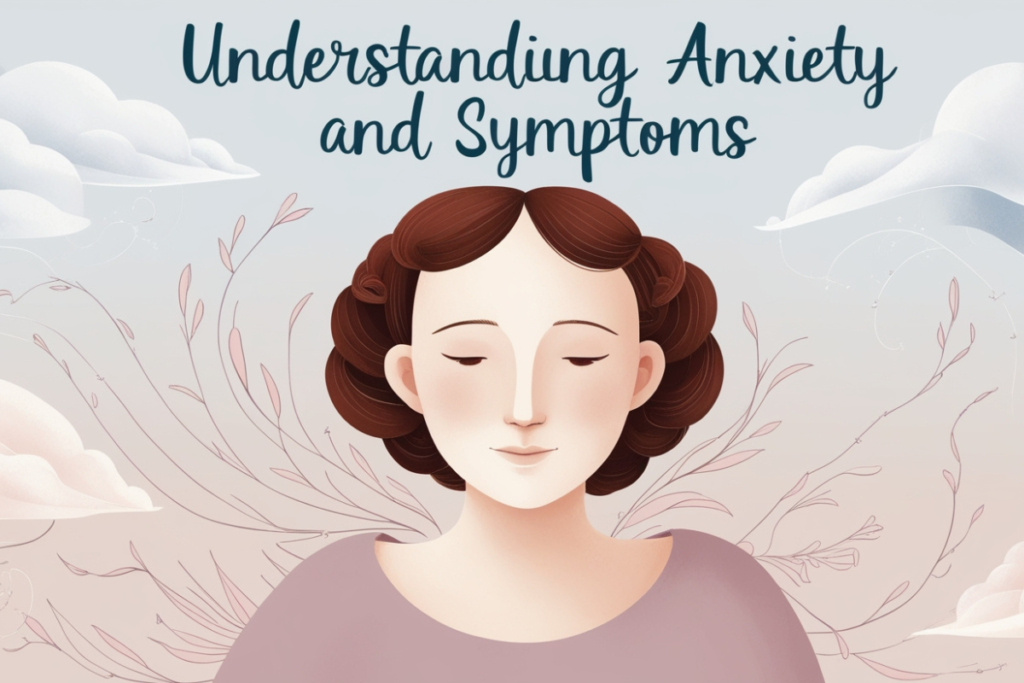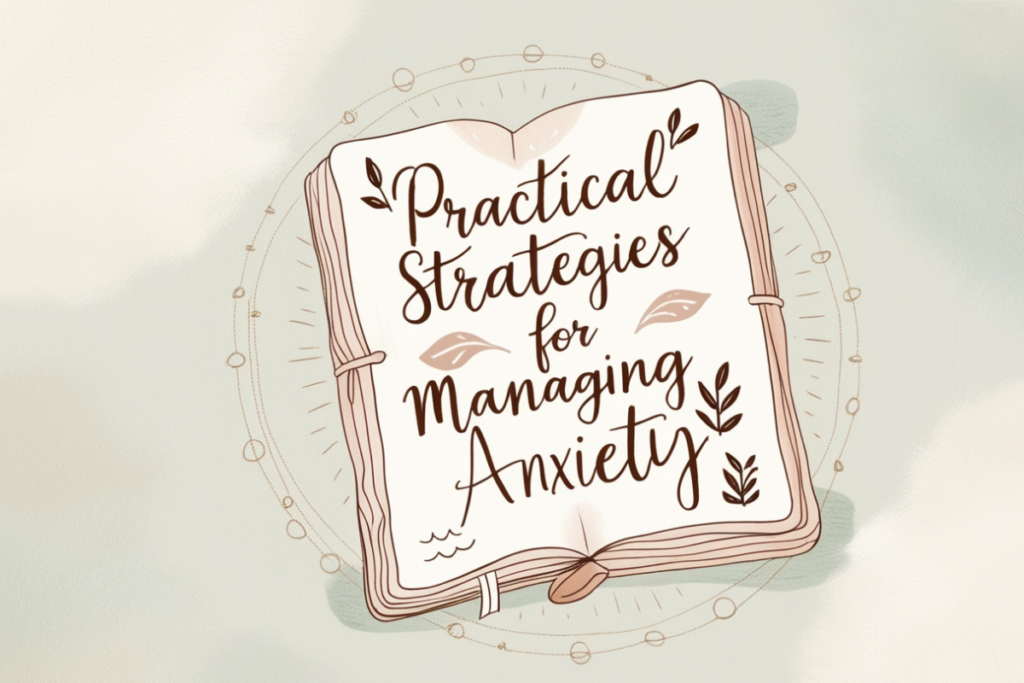Hello beautiful people, are your anxieties standing in the way of your dreams? I know you’re dealing with stress, anxiety, and depression but you’re not alone, there’s hope!
I’m here and together we’ll deal with all your issues regarding uneasiness so your mental and emotional balance will be maintained.
In this blog post, I’ll provide you with actionable approaches and we’ll dive into the basic understanding of anxiety and Symptoms, Practical Strategies for Managing Anxiety, Treatment Options, The Road to Recovery, Lifestyle Modifications, Real-Life Success Stories, and more.
Let’s begin!
Table of Contents
Understanding Anxiety and Symptoms

You might not know this but anxiety is a normal human emotion. When we perceive a threat or danger, it arises and prepares our body to fight. However, when this anxiety becomes excessive and persistent, it’ll begin to interfere with daily life and can turn into an anxiety disorder.
It can be apparent in various ways, such as:
- Excessive worrying about everyday activities,
- Irrational fears
- Phobias,
- Panic attacks, and
- Avoidance behaviors.
Following are the symptoms of anxiety and its impact on a person’s life:
Symptoms of Anxiety |
Impact on Person’s Life |
|
Heartbeat Fast |
Increased heart rate Pounding Heartbeats |
|
Sweating |
Too much sweating, especially in stressful situations |
|
Trembling |
Shaking or trembling hands, legs, or body |
|
Restlessness |
Feeling unable to relax or sit still |
|
Difficulty concentrating |
Trouble focusing, mind full of worries |
|
Sleep disturbances |
Insomnia, difficulty falling or staying asleep |
|
Impact on Quality of Life |
Reduced enjoyment of activities, constant worry |
|
Impact on Relationships |
Strained relationships, difficulty connecting |
|
Impact on Work Performance |
Decreased productivity, difficulty concentrating |
|
Impact on Overall Wellbeing |
Increased stress levels, decreased sense of wellbeing |
Practical Strategies for Managing Anxiety

Practical strategies are really effective in managing and dealing with stress. Here we’ll discuss all strategies for reducing your stress level, promoting relaxation, and improving overall mental well-being.
Manage Anxiety by Deep Breathing
Deep breathing is a very strong strategy for managing stress, this relaxes your mind and soul. Practice daily to take slow, deep breaths from your diaphragm, filling your belly with air before exhaling slowly. This will regulate your heart rate and promote relaxation.
Mindfulness Techniques
Engage your senses to increase awareness of your thoughts and emotions. Simply focus on your breath and surrounding sounds to quiet your mind.
Manage Anxiety by Exercise
Regular physical activity, such as walking, jogging, yoga, or dancing, will reduce anxiety. This will also improve your mood.
Time Management to Reduce Anxiety
You need to manage your schedule, set realistic goals, prioritize tasks, and practice time management to reduce feelings of anxiety. This will eventually reduce your burden.
Relaxation Techniques
Practice relaxation techniques to minimize stress like:
- Progressive muscle relaxation,
- Visualization, or
- Guided Imagery Treatment Options
The following video explains how to cope with anxiety:
The Road to Recovery
The path that we are gonna take to overcome all the challenges and achieve healing and growth in various aspects of life is our Road to Recovery.
Deal with all Challenges
Make yourself strong enough to deal with all life circumstances including loss, grief, and difficulty. Transform the way you think, be optimistic, and turn your obstacles into opportunities.
Overcome Depression
Adopt all strategies to maintain anxiety, stress, and other mental health issues. Building emotional resilience and trying to overcome depression.
Personal Care to Reduce Anxiety
Prioritize good sleep, a balanced diet, and regular exercise. Accept yourself and set personal goals for your growth and success. Keep calm and love yourself.
Connect with Right People
You’re not alone in this struggle. Surround yourself with understanding loved ones, friends, or a compassionate therapist. You can connect yourself with an anxiety support group, this’ll allow you to share experiences and receive empathy.
Celebrate Your Milestones
Celebrate your little achievements. Overcome all challenges you’re facing and remain calm in every situation. Focus on your progress, not your perfection.
Lifestyle Modifications
Key Area |
Lifestyle Changes |
| Prioritizing Physical Health |
|
| Building Resilience |
Practice:
Find healthy ways to manage stress such as:
|
| Developing Healthy Habits |
|
Remember:
- Consistency is Key
- Find What Works for You
- Celebrate Your Progress
Real-Life Success Stories
Stress is a common experience and it often feels like a constant presence in our lives. But, Stress doesn’t have to dictate how we live. There are inspiring stories of people who have managed and overcome stress. And they found peace and control in their lives.
I’m here with some stories to make sure that stress is not an unbeatable force. I know that you have the ability to take charge of your mental and emotional health, and ultimately you’ll also find greater peace and balance in life.
Story 1
There was a friend of mine named Sarah, she used to have a stressful job. She had lots of work with tight deadlines. One day, I was with her at her office and she had a panic attack. After that, she realized that she needed to change.
She started adopting techniques I told her like she started doing yoga, which helped her relax and focus her mind. Yoga also taught her a lot like she got more aware of her thoughts and feelings. Now, Sarah feels much better and knows how to handle stress. She takes care of herself, takes things easy, and even enjoys simple things in life.
Story 2
My neighbor, Lisa, had three young kids. She had a busy life and she always felt stressed out. She used to feel tired, had headaches, and was easily annoyed. When she saw that her family was getting affected, she knew she had to do something.
I helped her and she began by taking short walks, finding time to read for 15 minutes, and letting her kids help with house chores. After some days, these small changes helped her feel calmer and more focused. She understood that by putting herself first, even a little bit each day, she could become a better mom, wife, and person.
Story 3
Mark was a competitive athlete. He struggled with anxiety during competitions. This made him tense and he was unable to concentrate. But he knew he’d have to deal with this.
He learned breathing exercises and ways to relax. He started taking deep breaths, remained calm, and pictured his own success. As a result, he improved his performance. These techniques not only helped him deal with his stress but also made his daily life easier to handle.
Remember, you’re the one who can pull yourself out of stress, anxiety, and depression. There are simple steps including taking charge and implementing stress-management techniques, so you too can create a calmer and more fulfilling life.
Additional tips inspired by these real-life stories:
- Identify Your Stressors
- Prioritize Self-Care
- Don’t Be Afraid to Ask for Help
- Focus on What You Can Control
Conclusion
In conclusion, if you want to heal from anxiety, remember that it is a gradual process and it requires a lot of patience, perseverance, and a commitment to practice all the strategies constantly. But with determination and support, each one of you can find inner peace and satisfaction to deal with life’s challenges.
Accept yourself the way you are, celebrate your wins, embrace self-compassion, and prioritize well-being. Try to be a better version of yourself every day. With dedication, you’ll reclaim control and live a life free from constant worry.
Lorem ipsum dolor sit amet, consectetur adipiscing elit. Ut elit tellus, luctus nec ullamcorper mattis, pulvinar dapibus leo.
FAQ
1. How can my anxiety turn into a disorder?
If the anxiety level becomes excessive and persistent, or it interferes with your daily life for more than six months, you might have an anxiety disorder. It’s recommended to consult a doctor or mental health professional for the diagnosis and take proper medication.
2. What else I can do for a quick recovery?
You should build a strong support system, and connect with the people you love, your family or friends for understanding. Be patient and kind to yourself throughout the process. Your recovery will take time so keep making consistent effort.
3. How will anxiety affect my mental health?
Anxiety will cause you continuous worry, fear, and nervousness. It will impact your daily life, your relationships, and your overall well-being.
4. Enlist some practical strategies that help me in managing anxiety.
Practical strategies include:
- Deep breathing exercises,
- Mindfulness meditation,
- Regular physical activity,
- Healthy eating habits,
- Adequate sleep, and
- Seeking professional support or therapy
5. I feel like no one understands me, am I having anxiety?
Yes, this feeling of isolation can be a symptom of anxiety. Anxiety can make me over-conscious about my actions and appearance which leads to self-doubt and insecurities.




